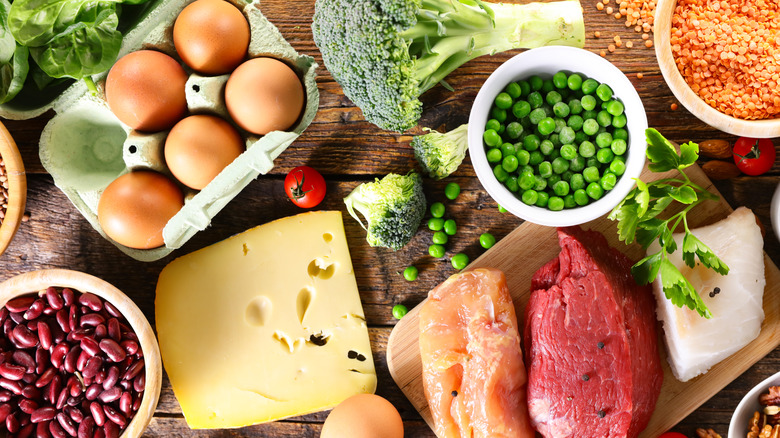Are You Eating Enough Protein For Your Age?
Protein is a macronutrient that gets a lot of attention in the health and wellness world, and for good reason. Protein serves many functions in the body including building muscle and providing energy (per WebMD). The amount of protein an individual should consume each day largely depends on factors like age, sex, and even their lifestyle. According to Harvard Medical School, consuming too much protein can be harmful.
The Dietary Guidelines for Americans have outlined recommended daily amounts of protein for different age groups (via WebMD). Children under the age of 4 should consume 13 grams, children between ages 4 to 8 should have 19 grams, and children 9 to 13 years old should eat 34 grams of protein per day.
As humans get older, recommended protein intake increases, but other factors should be considered as well, including biological sex. The Dietary Guidelines for Americans recommends women and girls ages 14 and older consume 46 grams of protein per day, whereas boys ages 14 to 18 should have 52 grams per day, on average. The exact recommendation differs based on body weight, notes Verywell Fit.
As people mature into adults, protein becomes even more critical, as Dr. Carol Greenwood, a professor in the Department of Nutritional Sciences at the University of Toronto, explains to Verywell Fit.
Why protein is essential as we get older
While the Dietary Guidelines for Americans recommends an average daily intake of 46 and 56 grams of protein for women and men respectively (via WebMD), Greenwood goes a bit further, suggesting that most adults aged 20 and up aim to consume between 60 and 70 grams of protein each day (per Verywell Fit).
Protein plays a critical role in aging. The older we get, the more important protein-rich foods are for maintaining health, according to Kaiser Health News (KHN). Wayne Campbell, a professor of nutrition science at Purdue University, tells KHN, "While eating an adequate amount of protein is not going to prevent age-associated loss of muscle altogether, not eating enough protein can be an exacerbating factor that causes older adults to lose muscle faster."
Doctors recommend high-quality sources of protein including poultry, fish, tofu, eggs, and dairy products (via WebMD). If you're looking for plant-based protein options, consider legumes, whole grains, nuts, and seeds. Another option to increase protein intake is adding a powder or liquid protein supplement, but nutritionists encourage real food when possible.
"The first line of defense should always be real food," notes Samantha Gallo, the assistant director of clinical nutrition at Mount Sinai Hospital in New York (via KHN). "But if someone isn't able to consume a turkey sandwich and would rather sip a protein shake during the day, we'll try that."


